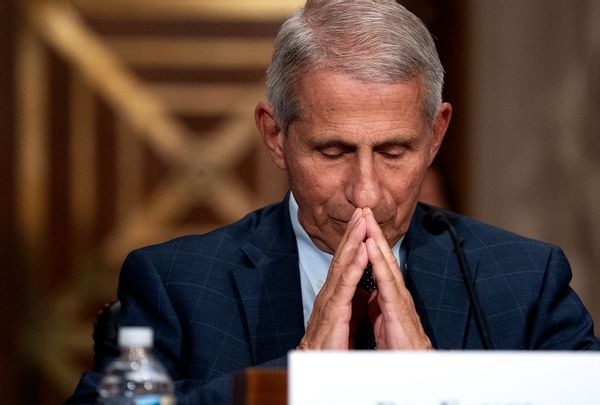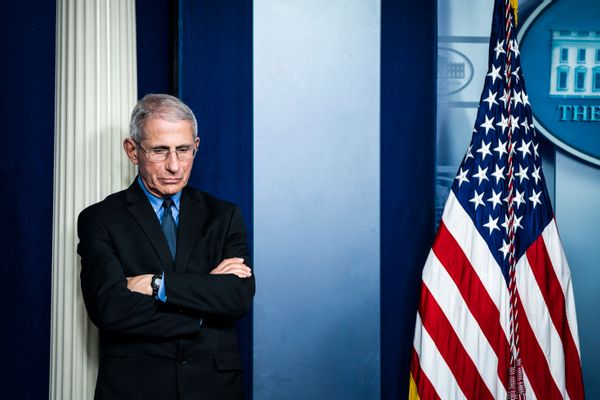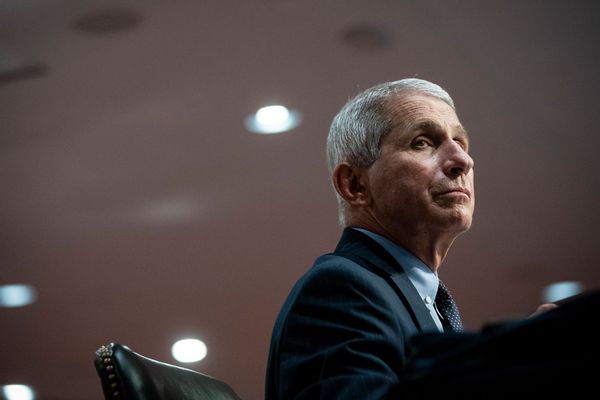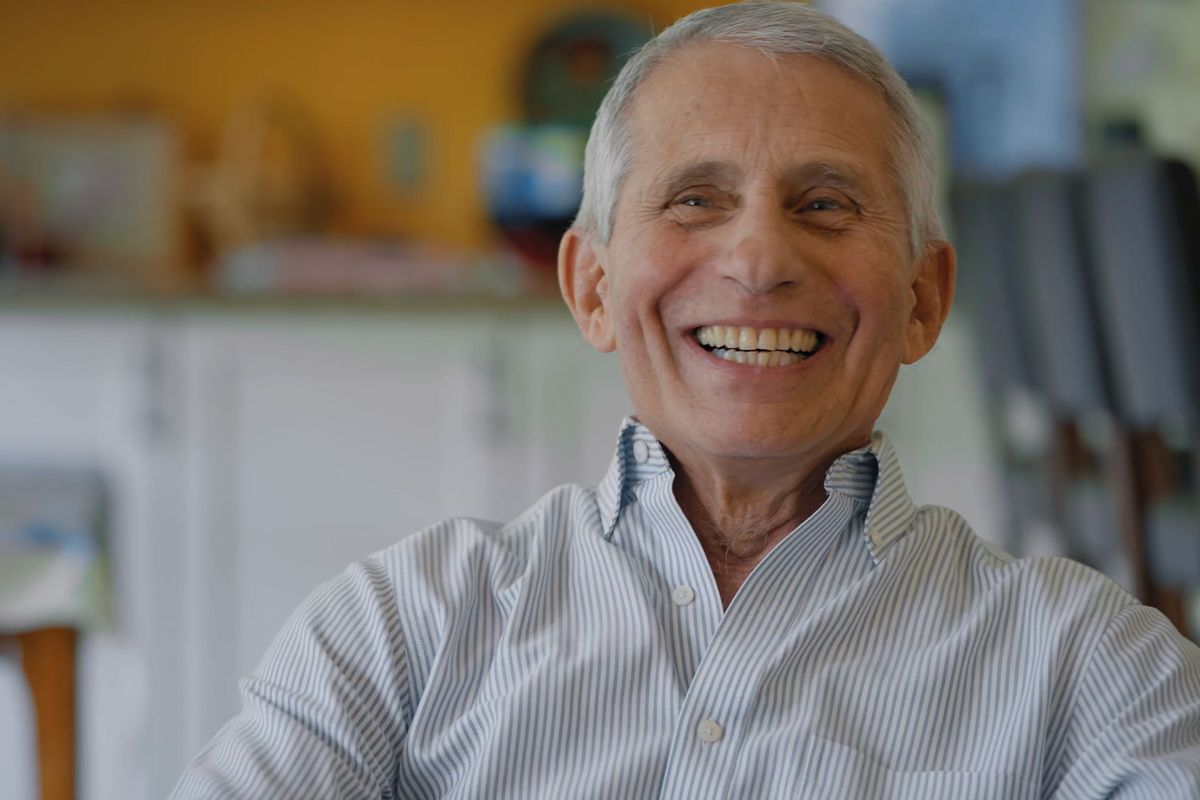Midway through "American Masters: Dr. Tony Fauci," filmmaker Mark Mannucci exposes the doctor to a symptom of violent partisanship: his voicemail messages. Fauci's inbox is swelled with accusations and death threats, but his assistants have shielded him from the worst. Nevertheless, Fauci urges Mannucci to play a few, allowing us to watch as he calmly listens to strangers fantasize about his suffering.
"Dr. Fauci, you have destroyed America," a woman declares in one voicemail, "and you know what? I hope that when you die, it is painful and it's long."
That's one of the nicer ones.
By this point in Mannucci's documentary, the viewer will have seen grandstanding politicians senselessly spar with Fauci expressly to fuel campaign fundraising soundbites. They'll have witnessed him quietly weep as Garth Brooks sings "Amazing Grace" at President Joseph R. Biden's inauguration only to pick up the phone minutes later to accept well-wishes from Jared Kushner.
Mannucci's camera allows us to tag along as Fauci walks the streets with D.C. volunteers in low-income neighborhoods as part of an effort to get more people vaccinated and react with exhausted dismay at one anti-vaxxer's thin reasons for refusing to get immunized. The lens also insinuates itself into the modest home he shares with his wife Christine Grady, where he genially shares a cheese plate with a group of AIDS activists with whom he is unguarded and at ease.
One should not be surprised at this point, then, to see how unperturbed Fauci is to hear such venom. They're not as shocking as the disease they signify. And that doesn't refer to COVID.
"It is interesting, troublesome, and sad, the extraordinary degree of divisiveness that we have in society," Fauci says when Mannucci finally presses pause. "Somebody who can look at a public health message, to turn that into hate for the person who is communicating it … you have to think about that for a second. I'm just trying to save people from getting sick and dying."
 Dr. Anthony Fauci, Director of the National Institute of Allergy and Infectious Diseases, listens during a Senate Health, Education, Labor, and Pensions Committee hearing at the Dirksen Senate Office Building on July 20, 2021 in Washington, DC. The committee will hear testimony about the Biden administration's ongoing plans to deal with the COVID-19 pandemic and Delta variant. (Stefani Reynolds-Pool/Getty Images)
Dr. Anthony Fauci, Director of the National Institute of Allergy and Infectious Diseases, listens during a Senate Health, Education, Labor, and Pensions Committee hearing at the Dirksen Senate Office Building on July 20, 2021 in Washington, DC. The committee will hear testimony about the Biden administration's ongoing plans to deal with the COVID-19 pandemic and Delta variant. (Stefani Reynolds-Pool/Getty Images)
As Mannucci shows, many people understand that. What they may not fully comprehend is how Fauci's innate humanity informs his history in public health, which extends years before he back the director of the National Institute of Allergy and Infectious Diseases in 1984.
"Fauci is a master because of the way that he has really handled public health over the course of 54 years: quietly, humbly, coming into the public eye only two major times," says Mark Mannucci.
Fauci will be only the fourth scientist to be featured as an "American Masters" subject in its 37 years of existence, joining Oliver Sacks, Albert Einstein and James Watson (in a film Mannucci also directed). But there is a tangible reason this "American Masters" installment uses Tony, not Anthony, in its title. If it does nothing else, Mannucci expressed in a recent interview with Salon, he hopes it will help people connect with the man behind the image, and "his humility, his candor, and the level of pain that he ended up expressing at everything that's going on."
"You know, if it weren't for COVID, he probably wouldn't have been chosen" as an "American Masters" subject, Mannucci said. "But he managed to stay the course in a very, very, very trying time […] As he says at the beginning of the film, 'I'm sure we will get over COVID. I'm not sure we'll get over this divisiveness. I worry more about that than I do about COVID-19.'"
Along with illuminating his history, "American Masters: Dr. Tony Fauci" also contrasts the two points in history when Fauci's name was invoked publicly as the face of government evil — the first being as the AIDS crisis was escalating unchecked, and the second occurring over the two years the filmmakers spent with him. It's a potent example of the difference between purpose-driven activism and senseless agitation designed purely to obscure facts and divide the public. We discussed this and other aspects of this warts-and-all look at Fauci's career debuting in the wake of his recent retirement in this interview, which has been lightly edited for length and clarity.
I think that when people think of "American Masters," a lot of times they assume the focus would be someone directly related to the arts. Many may wonder why Dr. Anthony Fauci would qualify. What do you say to that?
You know, "American Masters" has been expanding their purview in the last few years. This is my second film about a scientist with outsized reputation. The first one was about James Watson, the co-discoverer of DNA … who turned out to be an awful racist, and that is what brought down his career. So his story was informed by more than just his scientific discoveries, and he was a master. He discovered the code of life.
Same with Fauci. Fauci is a master because of the way that he has really handled public health over the course of 54 years: quietly, humbly, coming into the public eye only two major times, you know. I mean, yes, he was visible during the pandemics or the quasi-pandemics, or the almost-pandemics of the early 2000s: Ebola, Zika, SARS, etc. But he was instrumental in getting AIDS treatment, and AIDS clinical research on the map. He fought hard for that. And he was, you know, the champion for these guys. He really listened to them, as he says in the film, and he made a huge difference in making sure that research got done.
And then, of course, COVID. In spite of what many people believe, he really was instrumental both as a communicator, but also because his institute at the NIH spent 20 years developing a platform for a virus like this, because they always knew what was coming.
So people say they developed the [vaccine] in nine months. Well, they didn't really. […] That kind of strategy, that kind of strategic thinking, that kind of passion for really taking care of individual people through the rubric of public health, because he is a doctor at his core, makes him a person worthy of being called an American master.
 Dr. Anthony Fauci (Getty Images)
Dr. Anthony Fauci (Getty Images)
When you approached him for this project, to spend two years with him, was there any hesitation on his part?
No, there, wasn't. He was wrapping up another film with National Geographic, which was a very different kind of movie. It was a much more conventional, you know, hagiography. So why did he want to do another one? Well, his old medical school buddy said, "You got to. My daughter's a producer, and really should consider this." I think he decided to do it after meeting us for the first time and he saw that we wanted to tell different kind of story. To his credit, he said, "Yeah, listen, I want a 'warts and all.' I want to be portrayed as I am." He really gave us the access.
And last night at a screening, there was a question from the audience of "Why did you allow such an intimate portrait to be made?" He said, "Because I really want to see it get used to inspire another generation of scientists, I really wanted to have the chance to tell the truth about myself. And, you know, when do you get this opportunity?"
There was no hesitation about the idea, but we had to prove ourselves. So in the six months before we started shooting, we actually talked at least once a month to develop that trust. And that's what made the film different, I think, is that we got to know each other before we sat down.
The only thing it was off limits for us was the Oval Office and a couple of classified meetings, but he really gave us full access.
Fauci is also a figure who within the last few years, went from having a large segment of the population trust him to — let's call it an "unusually large" — segment grow louder in their efforts to discredit him. What difference do you think that made not only in terms of your approach, but maybe how that might have transformed the type of movie you thought you wanted to make going into it?
I mean, this was truly a rare opportunity. We have the past tense story of [the AIDS epidemic] that we had to bring to life. And we chose to do that by having it be as present tense as possible by bringing the [activists] to him. But we really did not know what the course of the pandemic would be, how he would react, and what would develop in terms of this animus towards him.
…On and on and on, things just kept happening. So it's very exciting to follow.
"I like to think of it as a rare opportunity to tell a really engaging story in the present tense," says Mannucci.
There were a lot of not-so-great things, but when you say exciting in the vernacular of a filmmaker, it means you have an opportunity to tell an engaging story. So we really didn't know … you know, we only we had our list of suspected events that would happen. And one thing we really didn't know was how the film would end, that, that he would step down. In fact, we finished the film in June of 2021. We thought we'd done it, we told the story. The pandemic had gotten to a lower boil. He took stock of his life. He expressed all sorts of things one would express at the end of the film about having a sense of accomplishment.
…And then in August, you know, I'm on vacation taking a bike ride and, the phone buzzes out of control. "Fauci is retiring," "Fauci stepping down." And we knew we had to open up the film and shoot some more, and tell the story and hear why. We just finished it in January. And it's a totally different ending now. He makes this decision in the course of the film, from seeing him as a man who's like, "I can't stop, I work 20 hours a day" to a man who says, "I can't be in the battle anymore." And that's quite an arc to witness. So yeah, that's how we were able to follow him.
That's good fortune for you as a filmmaker. I don't know if that's necessarily fortunate for the country.
No, exactly. That's what I was trying to express. I like to think of it as a rare opportunity to tell a really engaging story in the present tense. You know, and he made it easy. I mean, he's such an amazing subject, He wasn't easy at first. You know. It was very difficult to get him to get off the soundbites. It took weeks to have that happen.
That's probably a product of having been in this environment where everything is so controlled.
Exactly. I mean, he's afraid of saying something that would get turned against him. And he edits in his head. It took a while to develop the cues with him to say, "I know the facts. I want to know the experience." What was the experience? And that sort of shifted him away from telling us what we just heard on the news. We knew he couldn't make a film where he repeated what he had just repeated to Jake Tapper or Rachel Maddow, or anybody. And to his credit, he, he saw the film, and he had no issues with any of that, other than being surprised that he had let himself open up to the degree that he had opened up.
 Dr. Anthony Fauci (Al Drago - Pool/Getty Images)
Dr. Anthony Fauci (Al Drago - Pool/Getty Images)
You brought up his work with AIDS activists who were part of Act Up and their role in the film. I think their involvement in here is very important, but before I get into that, did you always know that you were going to use that part of Fauci's career as a point of contrast?
You know, it was an early question amongst all the producers of, how do we contrast what's going on in the country today with what went on with the AIDS activists? And I had no clue how to do it. Then we made the decision to not have any other voices in this film, just he and Chris. For me as a filmmaker, the biggest waste of time is to have fancy people telling you that this is the greatest person that ever lived …Yeah, what are they gonna say? But I knew we needed their voices.
It turns out they regularly go visit him because they all have business with him to some degree on some health issue or another. So they regularly go see him so I said, "Okay, you guys have your business but let's shift it towards telling the AIDS history. Like, just recap reliving that moment, taking stock of yourselves." And they all agreed to do it that way.
Interestingly, they didn't want to have me film dinner with him because they felt that was too intimate. But they let us film them having appetizers with him. … Audiences seem to be moved by it, so that's good.
Yes, and I think serves an important purpose in that here is an example of a previous protest where Fauci was used as the face of adversary. And he recognized that was theater: "It's not about me, it's about this issue."
It's amazing.
But the fact is that the protesters and the Act Up activists had a tangible purpose. They wanted data. They wanted access to medicine. These desires weren't ideological, it was literally a matter of saving lives and being taken seriously. They had a strategy, and they were willing to work together with Fauci and his team.
I think people don't realize the difference between what they were doing, and the COVID restriction protests today. There's agitation with purpose, and that has data behind it, and there's agitation just to be divisive and to put a face on something that people just don't want or want to demonize. That juxtaposition between the Act Up protests and the necessity of them and what we're seeing now is incredibly important.
Yeah. And we were very lucky that all that footage had been collected into one place, much of it is from David France's excellent [2012] documentary "How to Survive a Plague." Not all of the footage we use was in the film, but it all been organized for the film.
We were able to make this point of distinction because we had very clear footage of the 1980s and early 90s. And then Fauci's a genius, too. We go from the [anti-vaccination] protesters, and he says, you know, "These guys hate me because I stand for something that's inconvenient for them: the truth," and then cut the 1980s, when he says, "These guys wanted me to see what the truth was for them." Now, that's a pretty brilliant turn to do in real time, you know, but that's who he is.
He was really, really helpful and helped in allowing us to draw this distinction. Most of it came from them being able to express in that footage, what they wanted, both as the older man and, and the younger man. And then the other footage speaks for itself.
"American Masters: Dr. Tony Fauci" premieres at 8 p.m. Tuesday, March 21 on PBS member stations and is available to stream for 28 days after its broadcast premiere on the PBS app and online.
Read more
about Dr. Fauci



Shares